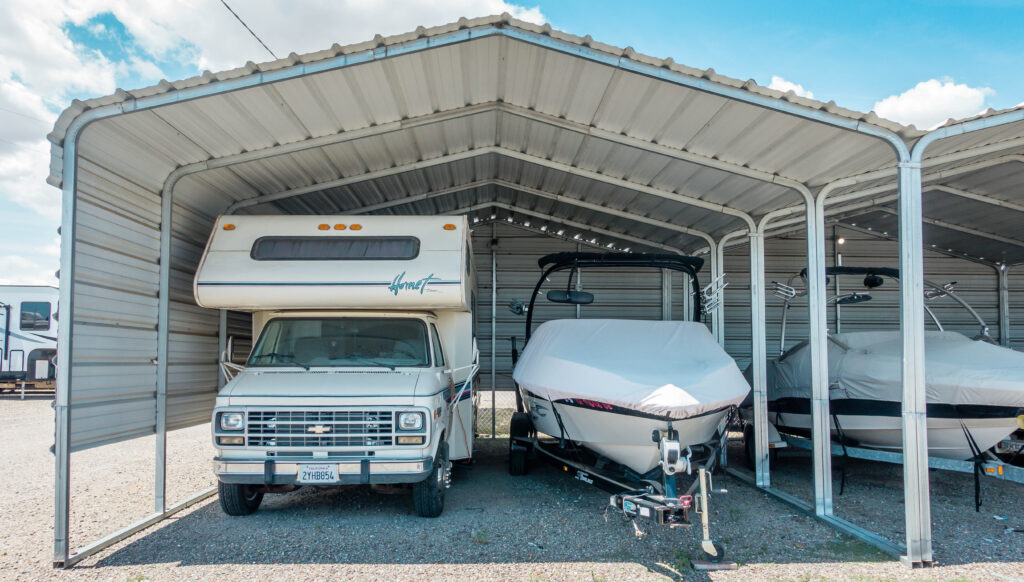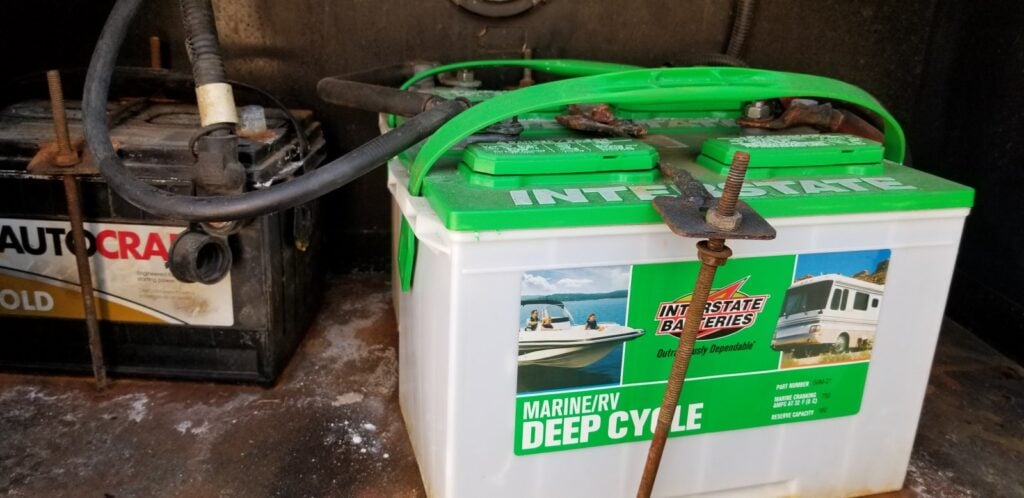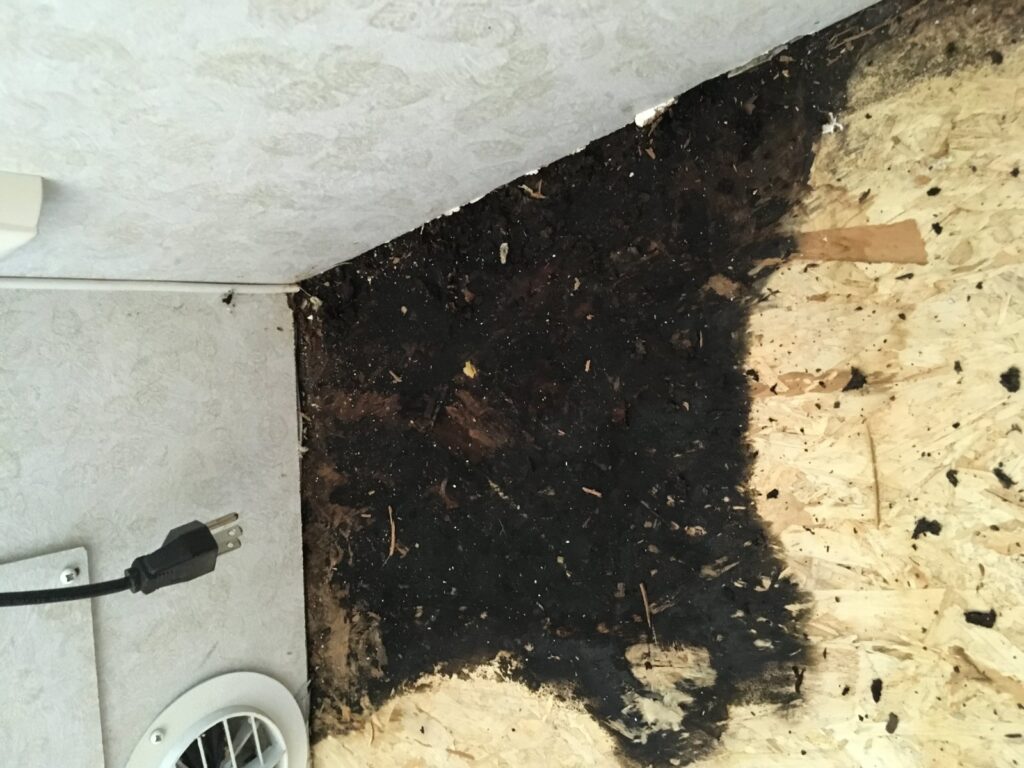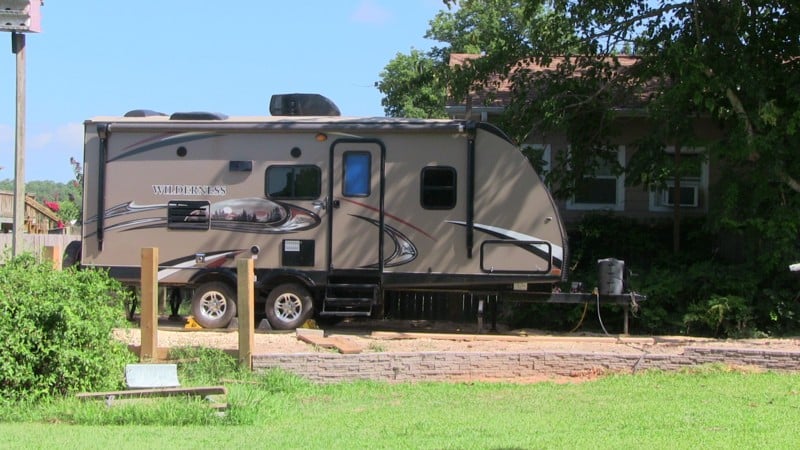
5 RV Storage Problems & How To Fix Them
Most RVers need to store their RV for extended periods from time to time. It might be seasonably (too cold/too hot) or due to other reasons that keep them from hitting the road for a while.
Here are 5 potential RV storage problems that you might encounter while storing your RV at home or at a storage facility and how to mitigate them.
1. RV batteries
If you don’t have the luxury of shore power available where you store your RV or have a modest solar system to keep your batteries charged while stored, you will need to consider the following:
- If freezing weather is expected while your RV is stored, consider removing the batteries and storing them at home in a space unlikely to freeze like a garage.
- Fully charge the batteries before storing the RV, then check the voltage of the batteries every three to six months. If the voltage reads 12.4 volts or lower, you will need to charge the batteries.
- If you store your RV with the house batteries still in the RV, you will need a way to keep the parasitic loads like your LP gas detector, clock radio, indicator lights, etc. from draining your batteries. The easiest way to accomplish this is to disconnect the batteries via a kill switch or removing a lead from the batteries. When disconnecting a battery, remember to always disconnect the negative lead first.

Keep your RV batteries charged – Photo via iRV2
Even if you do have shore power available, be sure your converter charger is a quality 3 or 4 stage charger that won’t overcharge and destroy your batteries. You might also consider using a battery tender.
2. Mold & mildew
Mold forming in your RV can be easily prevented by eliminating excess moisture from the interior of the RV. Consider employing one or more of the following to do so:
- Use desiccant crystals like Dri-Z-Air which absorb moisture from the air. Refill the crystals once the crystals have dissolved for continued protection.
- If you have access to shore power while your RV is stored, use a dehumidifier like an Air-Dryer to “dry up” excess moisture.
- Keep air moving in your RV by encouraging ventilation when stored by leaving a window open a crack and a roof vent slightly ajar. When you cover your RV make sure the cover is made from breathable material. This method is less effective in areas of high humidity.

Mold can be a huge problem in RV storage. Photo via iRV2
3. Rodents
Rodents can cause a whole host of problems if left unchecked while your RV is stored. The first item of importance is to prevent them from entering your RV by sealing any potential entry points in the belly of your RV with sealant, steel wool, or expanding foam.
If you leave your RV plugged into shore power, make sure the area where the power cord enters the RV has no extra room for a rodent to squeeze through. Secondly, remove any food from your RV and thoroughly clean the interior making sure no crumbs remain as a food source for rodents.
Finally, consider using repellents, traps or poison to keep rodents at bay. If using poison, consider one that won’t harm pets, children or animals in the food chain that feed on rodents. Many RVers find cotton balls soaked in peppermint oil an effective repellent.

Avoid storing your RV under trees. Photo via iRV2
4. Environmental elements
Environmental elements can also take their toll on your RV while stored. Here are some things to consider:
- Avoid parking your RV under trees or in tall grass.
- Close all window blinds/shades to prevent damaging UV rays from the sun fading/deteriorating furniture, carpeting, and wall paneling.
- If freezing weather is expected, make sure your RV is properly winterized.
- Make sure your tires are properly inflated and cover them to protect from UV rays.

Use a lock to prevent theft while your RV sits in storage. Photo via iRV2
5. RV theft
Don’t forget there are two-legged rodents out there that are looking to steal or burglarize RVs in storage.
- To deter theft on motorized and/or towable RVs, consider one or more of the following: wheel boot, hidden ignition kill switch, coupler locks, steering wheel lock, removing the start battery, security/remote camera system if you have shore power available.
- Make your RV less attractive to burglars by removing all valuables from your RV. Consider removing the batteries or invest in a lockable battery box as batteries are the most common item stolen since they can be readily sold as scrap by those looking to make a quick buck.
Finally, for safety purposes, remember to turn the LP supply off at the tank when storing your RV.
For more RV storage tips, check out this guide on RV Storage During The Off-Season.

I find this information informative and straight forward.
We have had some of these problems in the past so we know.
Twenty years ago I took a boat to a service center to have it serviced for winter storage in far northern Wisconsin. When I was leavimg the maint. Facility the owner reminded me to disconnect the batteries in the boat when after I parked the boat for the winter. I told him that I take the batteries out of the boat & put battery tenders on them. He told me a story about his battery manufacturers rep had shared with him. The rep explained to him that if you have a “good” battery that is fully charged and all you do is disconnect BOTH battery cables a fully charged, good battery will not freeze or lose its’ charge over the longest, coldest winters like they have in northern Wisc. I have been using this method ever since when storing boat and trailers. It works. The batteries stored like this are always ready start a boat or be ready to use in our trailer. Try it. You will like it.
And watch out for catalytic converter theft.
It is not enough to just turn off your propane tanks. Unscrew and disconnect the hoses. The reason being is that the hose nut depresses the pin in the valve and it can still get vented out if you have a faulty regulator,. The rubber diaphragm in the regulator hardens over time and gas can escape from it.
In SE MI winter snow freeze thaw on the roof can cause havoc so covered storage would be nice if possible. I’ll go with all metal class B or fiberglass trailer and avoid rubber roofs altogether next time.
We had mice once made a mess but damage was minimal at least. We stripped the trailer and washed everything including cushion covers and all surfaces.
Great tips!! We are hunkered down at the moment, but are already in the planning stages for trips in July, October and November. Of course had to cancel all of our March-July plans, but started the new one the other day.
We are looking forward to getting on the road again for a couple of months. Again, thanks for all of very helpful tips. I’ll be sure to implement many before hitting the road.
hi guys, i’m john.do you live your landing feet down or do you just not put them down when storing
?
Watch out for catalytic converter theft on motorhomes
Taking battery cables off is a great way to stop batteries from draining over the storage months weather it is winter or months of non use in the warmer weather. but the other electrical drain that nobody ever seems to think of is the electrical short between cells any time be it warm or cold. when storing remove the cell covers ( yes most are removable unless the batteries are completely maintenance free ). Take a paper towel and dry up any moisture on top of the battery as well as the underside of the covers. If you want to test this when you remove the cover and there is dampness or it may even be wet with moisture. Set your multimeter to volts and touch the top of the battery with the probe ends and you will get a voltage reading. This is a short between the cells that can run the battery down. There is an old wives tale about not storing on a cement floor. Well cement does NOT use up electricity it will be the acid deposits on the top of the battery that is running the battery dead. Always top up the batteries with distilled water before they are stored give them a good charge and forget about them till they are needed again. With this covid thing hanging over us you may be storing for longer periods of time, if so the batterie should be topped up with a charge every 6 months of non use.